Rolling hills, roaming deer and award-winning wines
6th November 2024
Based in the Cotswolds, the family behind Deer Park Wines are passionate about producing award-winning English wines, with a commitment to quality and sustainability. Rachel Hicks reports.
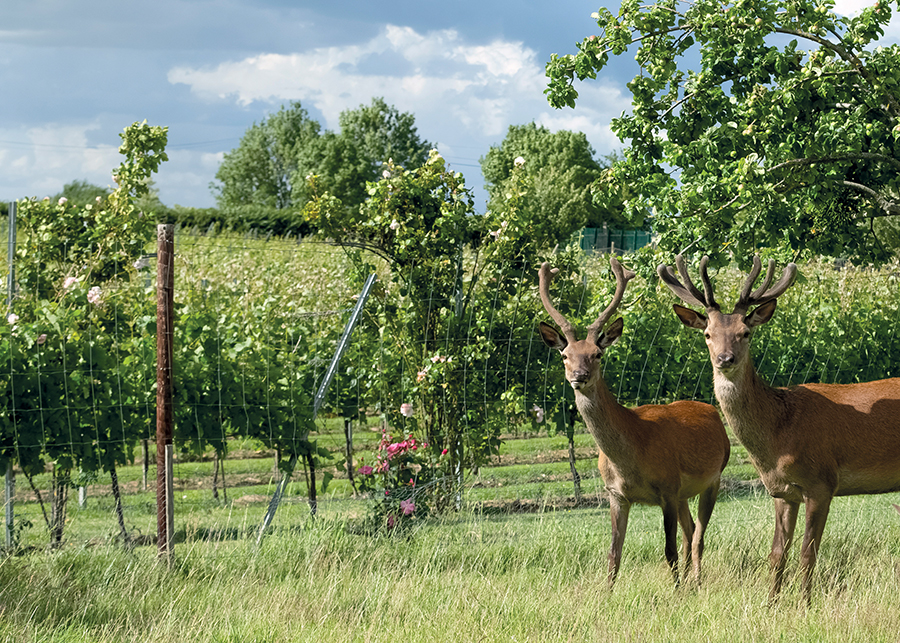
Deer Park Wines is one of a number of farm diversifications on the 500ha Woollas Hall farm situated on the slopes of Bredon Hill in South Worcestershire – an outlier of the Cotswold escarpment, while the vineyards are in the Cotswold AONB.
Run by Mark Steele and his wife Caron, the traditional mixed organic farm has been in the family for three generations, encompassing cattle, sheep, fallow deer, and crops such as oats, as well as woodland and natural grass meadows.
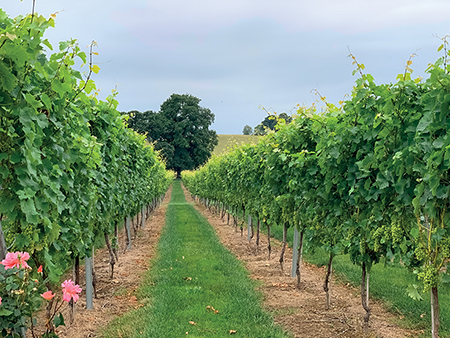
Mark comes from a family with a long history of farming, from mainstream agriculture, vegetables and dairy to its current-day vineyard and other diversifications. In the early 1990s, Mark set up a business selling fallow venison; in 2000, old redundant farm buildings were converted into offices and a conference centre, and from there the business expanded into a thriving wedding venue with holiday cottages. The farm was converted to organic in 2007.
Having run a couple of wine clubs, which involved trips abroad, some of Mark’s friends encouraged him to have a go at setting his own vineyard up – the changing climate, innovations in wine making and an accountant’s positive opinion all finally convinced him to take the plunge.
The vines that exclusively supply Deer Park’s wines now number 5,000 and are split between four plots of land on Bredon Hill.
The first, and largest plot at 2ha, with 4,000 vines, sits close to the farm buildings, on loam overlying limestone. Called Stag Oak, this planting is situated in a natural sun trap only 50m above sea level, and being sheltered from the wind offers the grapes the “perfect” terroir.
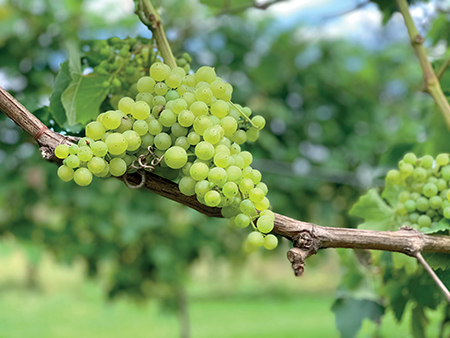
“Stag Oak was planted in 2016 on an old orchard site cleared in the 1960s, which was arable land until 2000 and grassland thereafter, organic from 2007,” explained Mark.
“A further 1,300 vines were planted in 2019 on a south-facing grassland parcel – called Manor, this vineyard includes 650 Chardonnay vines and 650 Pinot Noir; another 1,350 vines of Bacchus, Pinot Meunier, Pinot Noir and Chardonnay were planted in an arable field now known as Potters in 2021, while the fourth vineyard, Woodhenge, was planted in 2024, with 350 Solaris and 350 Cabernet Cortis vines. All vines were hand planted, with Mark commenting that he was glad he was a bit younger then!
Together, the four vineyards amount to around 4ha under vine. They have modern drainage systems as well as being on sloped land, and were soil tested and subsoiled prior to planting. In fact, the sites were chosen as much for the soil type as for the aspect.
All the vineyards have open aspects, which vary from due south facing through south westerly, to gentle northerly – but are sheltered from damaging winds by the natural landscape. At 52–64m above sea level, the river Severn is only six miles away and the river Avon runs along the bottom of the farm less than half a mile from the vineyards, creating a microclimate. The vale of Pershore/Evesham has long been famous for its soft fruit production, apples and plums and benefits from the warming influence of the rivers.
While the farm itself is organic, the vineyards are not – although Mark doesn’t use any insecticides, relying instead on natural pest control.
Meeting the changing challenges
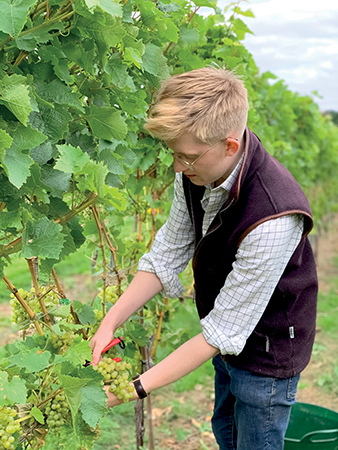
According to Mark: “Each year throws up its own challenges – no two are the same, and the one thing that farming teaches you is that you’ll never get everything right; which is also something that my wife constantly reminds me!
“Last year we saw our first cases of the vinegar fruit fly in our Pinot Noir, which required more diligence at harvest time.
“Despite the droughts, 2022 was a good year for us; our predominantly clay subsoil provides enough moisture so yields were not affected, we kept the wasps at bay and the harvest was good, although not as early as we had expected. Perhaps the extreme weather caused the vines to shut down during the intense periods of heat.”
When discussing this year, Mark comments that 2024 seemed to be following a similar pattern to 2023 – with a promising start fading away into too much cloud, rain and average-to-low temperatures.
“2023 produced excessive foliage growth, so canopy management was key. Targeted leaf stripping and several passes of our vine trimmer kept the canopy open enough to allow good penetration and coverage of plant protection products; in contrast, our vine trimmer was only used once in 2022 and we managed to reduce our fungicide applications by over 15% that year, too.”
In 2023, the productive vines yielded 23 tonnes, which Mark says was a bit too much. “This year we decided to restrict production to about 17t by green harvesting,” he explains.
However, as it turns out, this year’s harvest has been difficult to say the least – severe mildew took the entire crop of Reichensteiner, and reduced the yield of Bacchus by 75%. Across the vineyard, yields were down by an average of 55%. “Once the crop was infected, it seemed almost impossible to control the infection despite intensive canopy management – our labour and chemical costs were up by almost 25%. But the Seyval was surprisingly clean and yielded well and our Pinot and Chardonnay faired relatively well, coming out of the press at 77Oe and 11.4ta and 70Oe and 13.5ta respectively,” Mark shares.
Deer Park is now established enough for Mark to manage the vineyards without a regular agronomist, with Matt Greep from Agrii visiting around twice a year – however, Mark says Matt is always available at the end of the phone if needed.
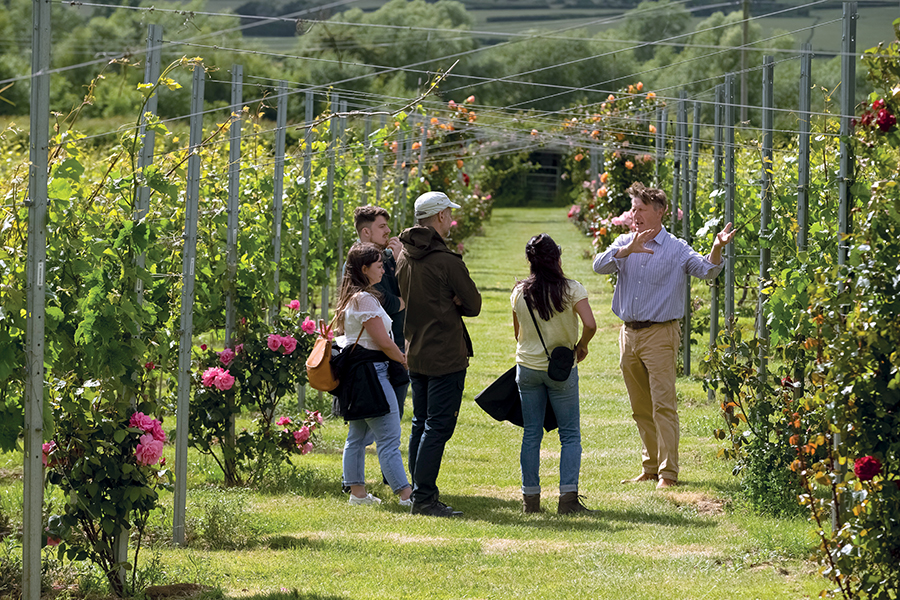
Managing pests and disease
Mildew, botrytis, wasps and, more recently, vinegar fruit fly all pose a challenge to the vineyard team.
“All our vineyards are fully deer-fenced and rabbit-netted to exclude our own deer and the ever-increasing wild population,” explains Mark.
“We have a rigorous fungicide programme that aims to send the cleanest grapes into the press and hence a purer, cleaner wine.
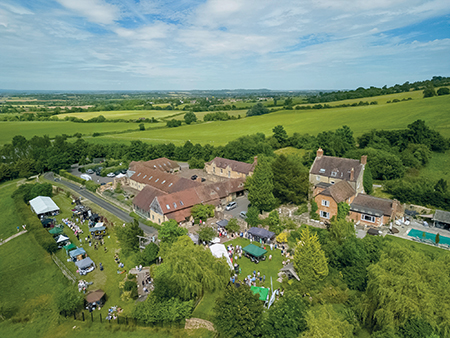
“We are trialling the use of willow chip off the farm as an under-vine mulch to suppress weeds and provide a dry warm semi-reflective surface. Willow bark contains salicylic acid and an aqueous extract of willow bark is used as a fungicide in the EU. The willow bark extract is approved as a ‘basic substance’ product in the EU and UK for the control of scab, leaf peach curl and powdery mildew on grapes, apples and peach crops, so this might be an additional benefit.
“Wasps are our main pest – damaging bunches and leaving room for infection. We put out nearly 100 wasp traps in July to try and catch early wasps before the nests get too big. We have just started to use Easy Lure traps which catch both wasps and flies, and seem to work really well with their special lure.”
Optimising vines through pruning
The vines are on VSP/Double Guyot trellising with metal posts throughout. “We have more recently adopted the Italian Simonit & Sirch system of pruning, which aims to promote sap flow to the active growing points by minimising the amount of pruning cuts/wounds and respecting the path of sap flow,” explains Mark. “The system has been difficult to implement on our older vines, but we firmly believe will be highly beneficial in the long term as our vines should stay more productive for longer. We also aim to keep a productive canopy by regular trimming and manual leaf stripping of old leaves.”
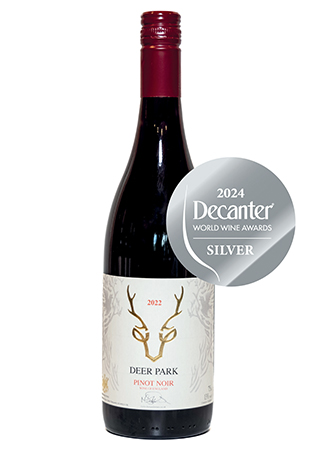
The site experiences bud burst about a week earlier than most vineyards due to its westerly location and riverine elevation, Mark says. Luckily, frost doesn’t seem to be a problem at Deer Park, with no frost damage at all in 2023 and 2024 and only around 30 buds lost in 2022.
Harvesting and winemaking
Grapes at Deer Park are hand harvested by groups of friends, who are then treated to a lunch in the vineyard and a going away present of wine.
Deer Park Wines uses local winery Three Choirs to produce its own wine portfolio, which includes still Solaris, Bacchus, Chardonnay, Pinot Noir, a Deer Park rosé (90% Pinot Noir and 10% Chardonnay), Stag Oak (60% Chardonnay, 40% Solaris), Special Reserve (80% Reichensteiner, 20% Seyval Blanc), a Classic Cuvée Sparkling (60% Chardonnay, 40% Seyval) and the Deer Park Rosé Cuvée Sparkling (40% Pinot Noir/Meunier, 60% Seyval).
Cabernet Cortis, which is a cross between Solaris and Cabernet Sauvignon, is the most recent variety to be planted, and according to Mark: “If we get the best of both varieties, it could be very interesting indeed!”
Sparkling wines are made using the traditional method, and the majority of wine sales are conducted through vineyard tours and online sales, with other sales through wildlife tours, its annual Wine Fayre and through Deer Park’s own wedding venue business and overnight accommodation.
Some trade sales are made to local pubs and restaurants, and the vineyard is extending its cellar door sales even further via the introduction of themed nights this winter.
Grower profile
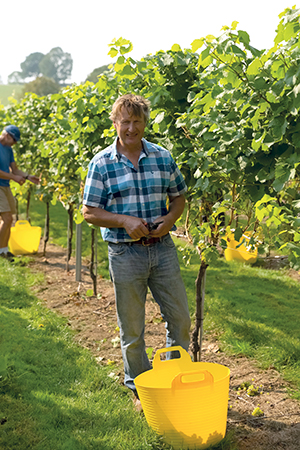
Deer Park Wines
Location: Bredon Hill, South Worcestershire
Total vineyard size: 4ha, split into four separate vineyard areas: Stag Oak, Manor, Potters and Woodhenge
Soil type: Cotswold brash over clay loam
Aspect: Varying from due south facing through south westerly, to gentle northerly – but all are sheltered from damaging winds by the natural landscape
Varieties grown: Solaris, 850 vines; Pinot Noir (burgundy clones), 1,500 vines; Chardonnay, 1,550 vines; Bacchus, 1,250 vines; Seyval Blanc, 950 vines; Reichensteiner, 500 vines; Pinot Meunier, 300 vines; Cabernet Cortis, 350 vines
Rootstock: All rootstock in Stag Oak and Manor is SO4. In Potters and Woodhenge it is Fercal
Read more grower profiles
Read more vine news
